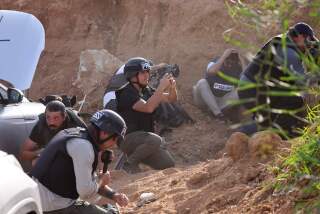It’s Your Right to Know : A necessary protest about manipulative Pentagon press policy in the Gulf
- Share via
The Constitution, recognizing the need to “provide for the common defense,” gives Congress the power to raise and support land and naval forces. That same Constitution, recognizing that an informed public is essential to the survival of American liberties, also seeks to assure the unhindered dissemination of information by prohibiting laws “abridging the freedom of speech, or of the press.”
There is no incompatibility, no inherent conflict between the requirements of an effective defense establishment and democracy’s compelling need for a free and unintimidated press. An unhealthy tension between the press and the military nonetheless has come to exist, dramatized by sweeping efforts made during the Reagan Administration to severely control the media’s access to military operations, and intensified in the Persian Gulf War by the restrictions imposed on press movement and reporting by President Bush’s Pentagon.
This week a group of prominent news executives met with Defense Secretary Dick Cheney to again call to his notice, and to protest, the constraints put on press coverage in the Gulf War. Those restrictions were diverse and wide-ranging, extending from the significant to the petty. They included acknowledged failures to provide necessary transportation and communications facilities for correspondents and repeated overt and zealous instances of interference with correspondents who tried to conduct uncensored interviews with American service personnel. Some participants came away from the Cheney meeting with the sense that the defense secretary was hearing many details about the obstacles put in the path of the press for the first time.
The military, like any arm of government or any firm in the private sector, aims for the most favorable public assessments of its activities. But the military is not just another remote institution trying to promote a good image. The military is the citizenry in uniform, maintained at enormous cost to the taxpayers. That it is charged with doing a vital job in no way excuses the military from the obligation of having its performance fairly observed and fairly reported on. Efforts at news management in the Gulf, as earlier in Grenada and Panama, are plainly and simply efforts at manipulation, the chief aim of which is to deny the public information about how its armed forces are performing.
The public’s right to know is one of the glories and one of the indispensable safeguards of American democracy. Protests over news management in the Gulf War are in defense of that right.
More to Read
Get the L.A. Times Politics newsletter
Deeply reported insights into legislation, politics and policy from Sacramento, Washington and beyond. In your inbox twice per week.
You may occasionally receive promotional content from the Los Angeles Times.










